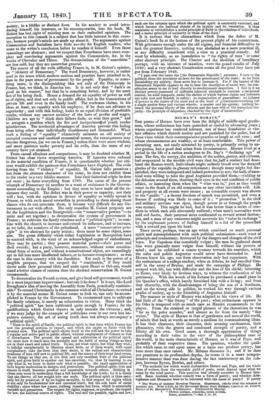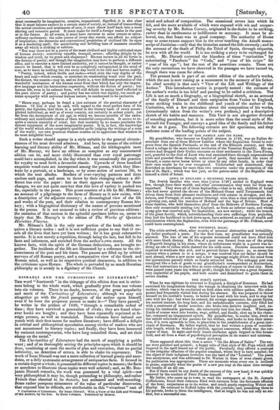MILMAIS'S HORACE. * THE poems of Horace have ever been the
delight of middle-aged gentle- men, whose enthusiasm has been quenched or cooled by advancing years ; whom experience has rendered tolerant, not of those fraudulent or vio- lent offences which disturb society and are punished by the police, but of those vices which their contemporaries practise or laugh at sub rose ; and whose circumstances are wealthy, or at least comfortable. This power of attracting men, not easily attracted by poetry, is primarily owing to na- tive genius, but a good deal arises from circumstances. Horace lived at a period in the life of a nation analogous to Dr. Day's "declining age" of man. The fire, the energy, the ambition of the nobles, gentry, and citizens, had evaporated in the terrible civil wars that for:half a century had deso- lated the Roman world. Individuals might sullenly brood over the decayed glories of the republic in gloomy retirement ; though many might feel dis- satisfied, they were indisposed and indeed powerless to act; the bulk of man- kind were willing to take the good Augustus provided them,—yielding to the delusion around them, shutting their eyes to the real condition of public affairs, or lamenting them when the " wine was in," just as they would recur to the death of an old companion or any other inevitable evil. Life and property at all events were secure ; an ostensible respect was shown to the "public " ; a decent freedom of speech was permitted, and even a licence if nothing was likely to come of it ; promotion " in the civil and military services was open, though power in or through the people was extinct. This might be bad, but it was better than a series of' con- flicts in which each side alternately suffered ; when men's moveables were sold sub haste, their paternal acres confiscated to reward armed faction- ists, and a man of any eminence might ascertain his "value in exchange " by the unpleasant process of finding himself in a list of the proscribed with a reward put upon his head.
There never, perhaps, was an age which combined so much personal spirit and accomplishment with such political submission—such want of principle and consistency, destroyed by the dangers and changes of the civil wars. For Napoleon was essentially vulgar ; the men he gathered about him were generally more vulgar than himself, without his powers of mind ; and he exhibited a coarse tyranny towards his courtiers, which the calm and politic Augustus would never have descended to. And Horace knew his age, not from observation only but experience. With the enthusiasm of a college student, when at Athens, he had enrolled him- self in the army of Brutus, and made the campaign of Philippi. He escaped with life, but with difficulty and the loss of his shield; returning to Rome, very likely by devious ways, to witness the confiscation of his patrimony. With the wreck of his fortune he purchased a small place in the Questor's office, which barely furnished him with a living; and from that obscurity, with the disadvantages of being the son of a freedman, and on the wrong side in polities, he worked his way through various grades of society, up to the friendship of Augustus himself. The manner or style of Horace was adapted to his views of life. He had little of the "fine frenzy " of the poet ; what enthusiasm appears in his Odes is tempered with as much care as Hamlet recommends to the player. From the strained or turgid phrases of the rhetorician he was "far as the poles asunder," and almost as far from the merely "fine writer." The style of Horace is that of gentlemen and men of the world, of minds that look at words as merely a medium for communicating ideas. It has their clearness, their closeness, their seeming carelessness, their pleasantry, with the graces and condensed strength of poetry, and a felicity all his own. Good sense, a thorough appretiation of things according to their value in the view of the philosophical man of the world, is the main characteristic of Horace, as it was of Pope, and probably of their respective times. The question, whether the quali- ties which seem to rest upon sense as a basis can produce poetry, has been more than once raised. Mr. Milman discusses it ; and if he does not penetrate to its profoundest depths, he treats it in a more compre- hensive manner than was done during the last controversy on the sub- ject, between Byron, Bowles, and others. " The resthetic law which would disfranchise Horace and Pope, and the whole class of writers, from the venerable guild of poets, must depend upon what we mean by the word poetry. This question had already occurred to Horace him- self. Some doubted whether comedy was a form of poetry; and whether Aris- tophanes and Menander were to be honoured with the name of poets.t if poetry * The Works of Quintus Iforaflus Flamm. Illustrated, chiefly from the remains of Ancient Art. With a Life, by the Reverend Henry Hart minas., Canon of St. Peter's, Rector of St. Margaret's, Westminster. Published by Murray.
t " Idcirco quidam, comeedia, nine poema, Esset, qutesivere."—Sat. I. iv. 45.
must necessarily be imaginative, creative, impassioned, dignified, it is also clear that it must become extinct in a certain state of society, or, instead of transcribing the actual emotions and sentiments of men, it must throw itself back into a more stirring and romantic period. It must make for itself a foreign realm in the past or m the future. At all events, it must have recourse to some remote or extra- ordinary excitement: the calm course of every-day events can afford no subject of inspiration; the decencies and conventional proprieties of civilized life lie upon it as a deadening spell; the assimilating and levelling tone of manners smooths away all which is striking or sublime.
" But may there not be a poetry of the most civilized and highly cultivated state of human society; something equable, tranquil, serene; affording delight by its wisdom and truth, by its grace and eloquence? Haman nature iu all its forms is the domain of poetry; and though the imagination may have to perform a different office, and to exercise a more limited authority, yet it cannot be thought, or rather cannot be feared, that it will ever be so completely extinguished in the mind of man, as to leave us nothing but the every-day world in its cold and barren reality.
"Poetry, indeed, which thrills and melts—which stirs the very depths of the heart and soul—which creates, or stretches its reanimating wand over the past, the distant, the unseen—may be, and no doubt is, a very different production of the wonderful mechanism of the human mind from that which has only the impres- sive language and the harmonious expression, without the fiction of tooetry; but human life, even in its calmest form, will still delight in seeing itself reflected in the pure mirror of poetry ; and poetry has too much real dignity, too much ge- nuine sympathy with universal human nature, to condescend to be exclusive- " Hence may, perhaps, be found a just estimate of the poetical character of Horace. Of him it may be said, with regard to the most perfect form of his poetry, the Epistles, that there is a period in the literary taste of every accom- plished individual, as well as of every country, not certainly in ardent youth, yet far from the decrepitude of old age, in which we become sensible of the extra- ordinary and undefinable charm of these wonderful compositions. It seems to re- quire a certain maturity of mind; but that maturity by no means precludes the utmost enjoyment of the more imaginative poetry. It is, in fact, the knowledge of the world which alone completely qualifies us for judging the writings of a man of the world; our own practical wisdom enables us to appreciate that wisdom in its most delightful form.
Such a writer should appear in a style suitable to the general circum- stances of his most devoted admirers. And here, by means of the critical learning and literary ability of Mr. Milman, and the bibliographic taste of Mr. Murray, we have an edition as complete as any unannotated edition can be, and more richly illustrated than ever royal patronage could have accomplished, in the day when it was occasionally the practice for royalty to send forth a favourite classic. Upwards of three hundred exquisite wood-cuts are interspersed among the poems, which they illus- trate by a portrait, or a landscape, or by some action of ancient life, to which the text alludes. Borders of ever-varying patterns and tints enclose each page, and seem to throw by their changing colours a dif- ferent hue over the paper : but as there appears no reason for these changes, we are not quite sure but that this love of variety is pushed too far, especially in the prose. This prose consists of a life by Mr. Milman ; an account of a pilgrimage to the farm of Horace as it now exists, with a description of the adjacent country ; a chronological view of the life and works of the poet, and their relation to contemporary Roman his- tory ; with a biographical dictionary of the names of persons mentioned in the poems. It is not unusual to take a review of previous editions : the omission of that custom in the splendid specimen before us, seems to imply that Mr. Murray's is the edition of The Works of Quintus Horatius Flaceus.
Mr. Mihnan's Life is the only new portion of the book which re- quires a literary notice : and it is not sufficient praise to say that it ex- cels all the lives that have yet been written ; for it has great substantive merits. It is not merely a repetition, through being the last, but full in its facts and inferences, and enriched from the author's own stores. All the known facts, with the spirit of the German deductions, are brought to- gether. The incidents of the life are illustrated by a reference to the cir- cumstances of the poet and his times. The pauses are filled up by critical surveys of old Roman poetry, and a comparative view of the Greek and Roman mind, as well as its respective poetical characters, in addition to the criticisms upon Horace. The whole is pervaded by as much Horatian philosophy as is seemly in a dignitary of the Church.



























 Previous page
Previous page